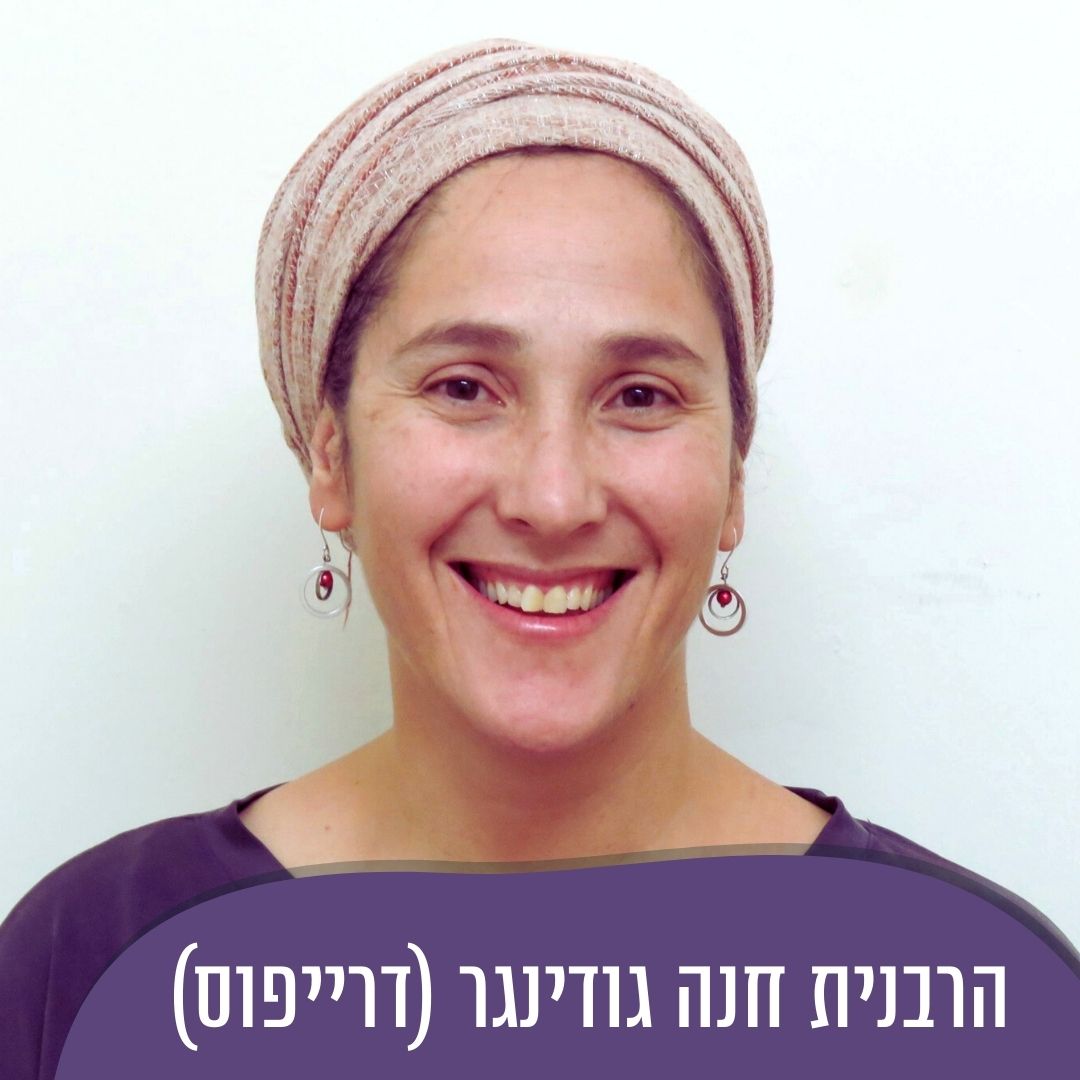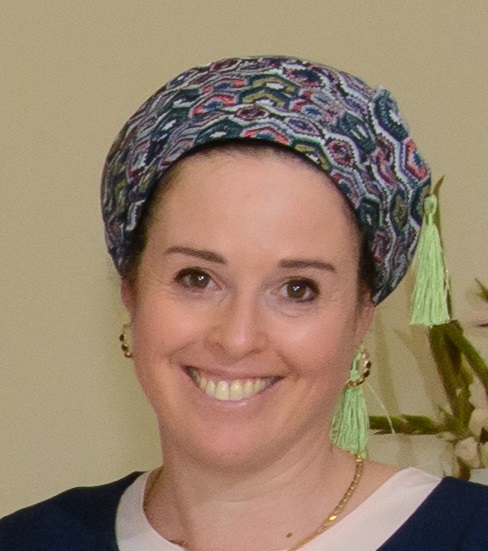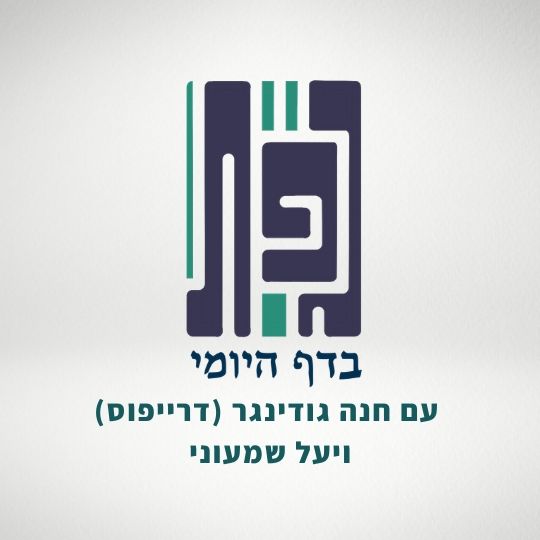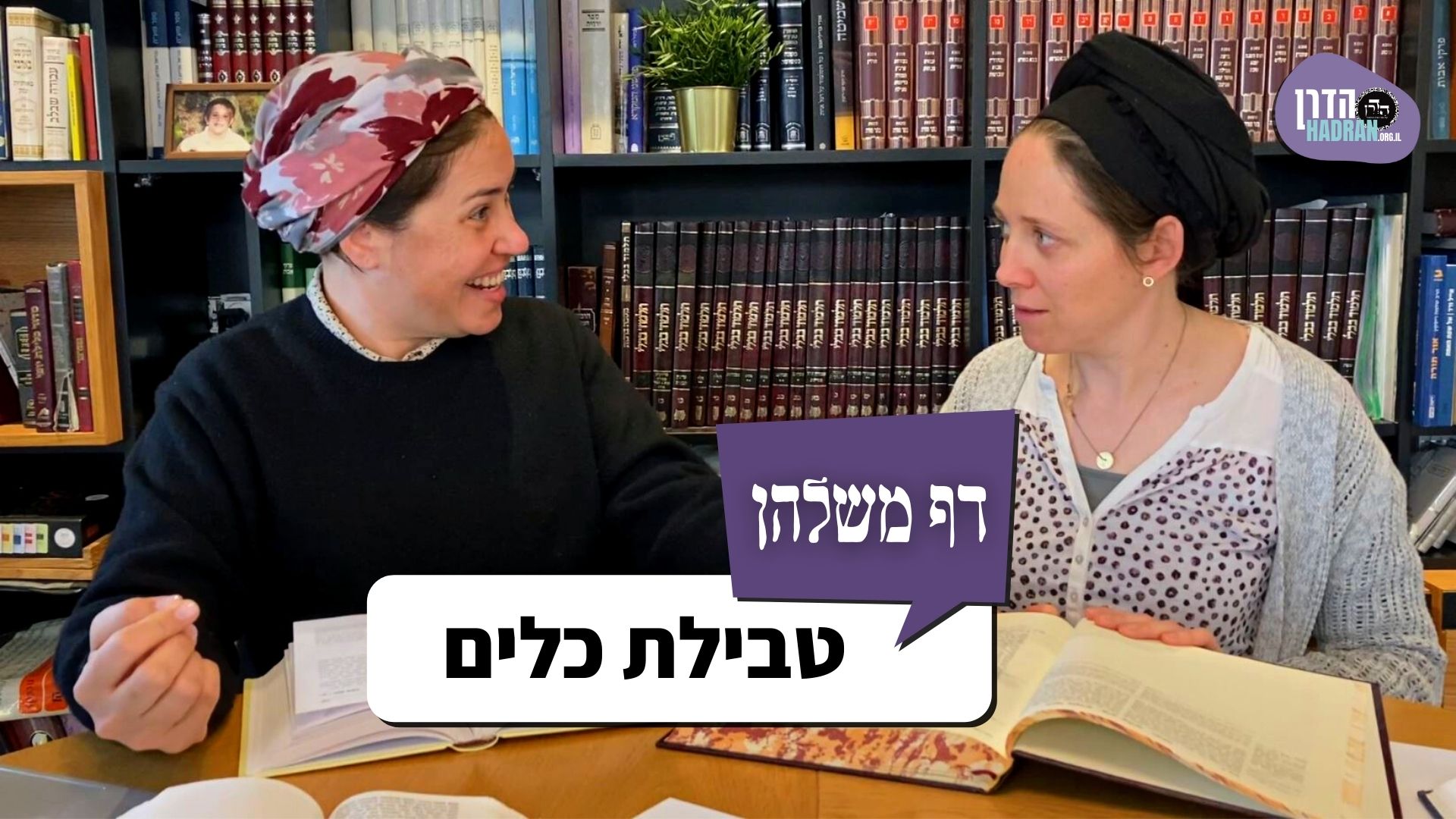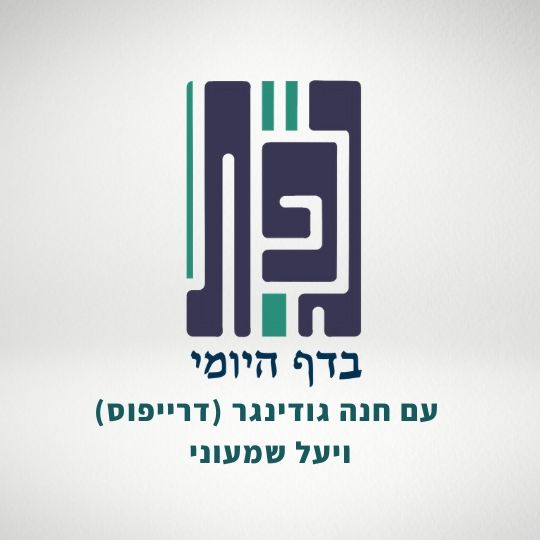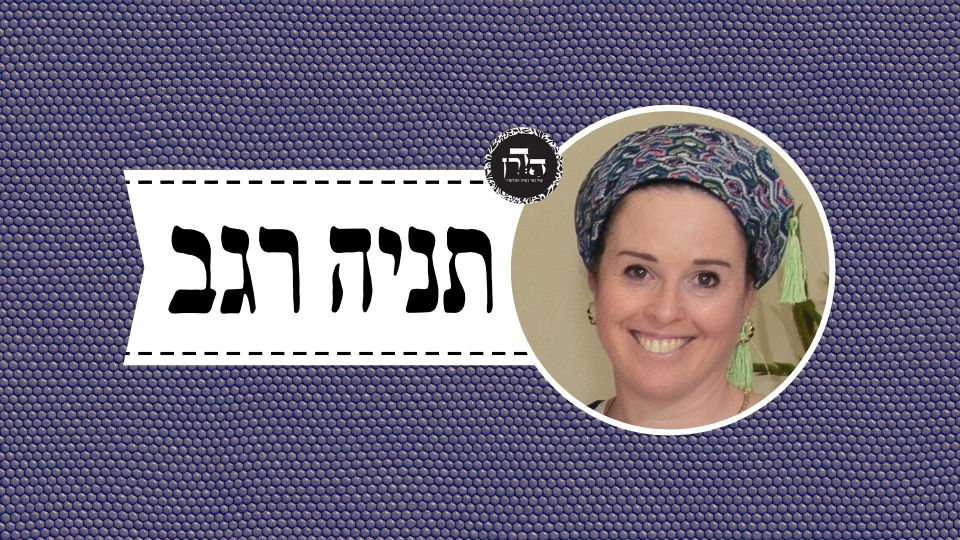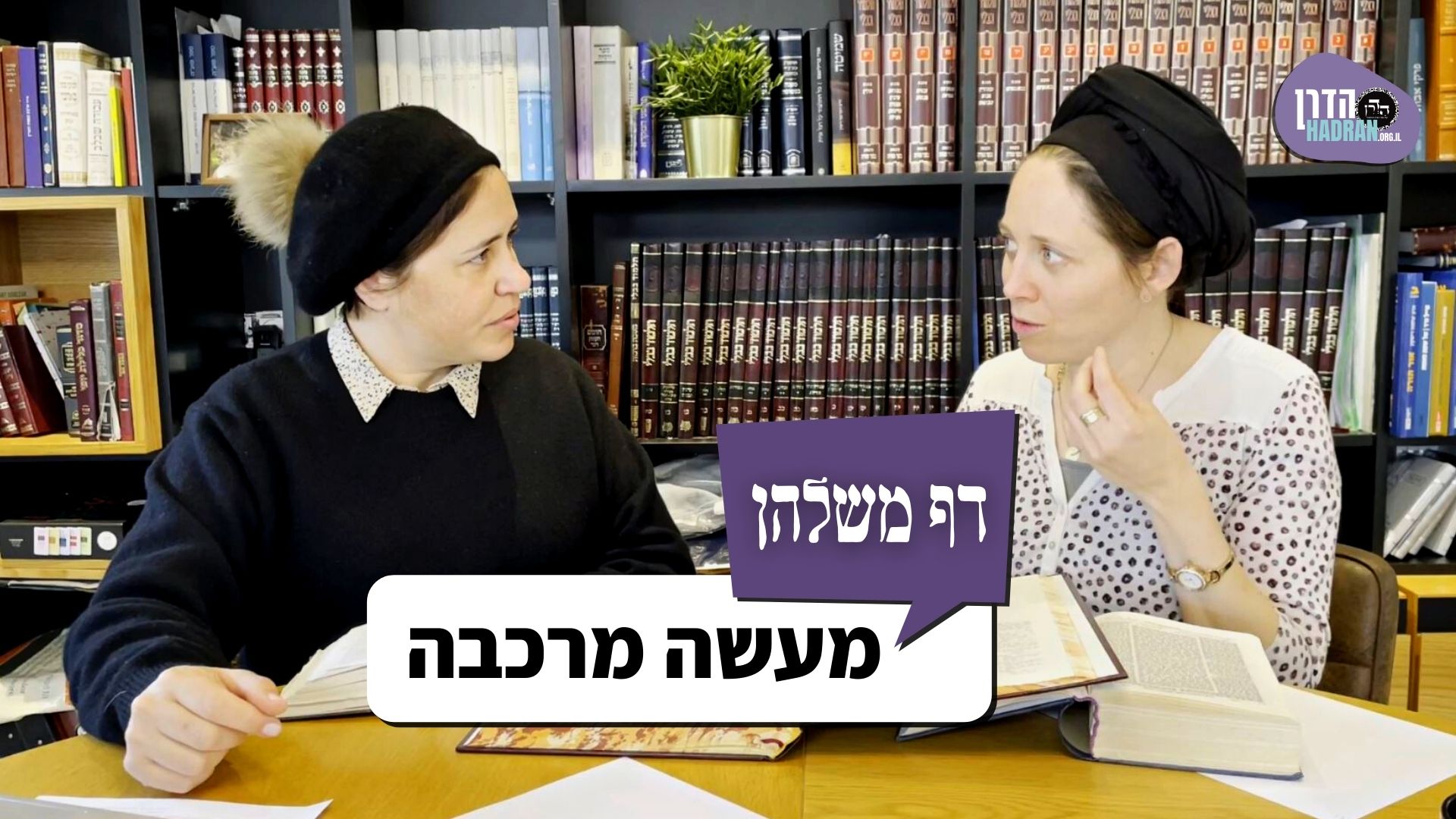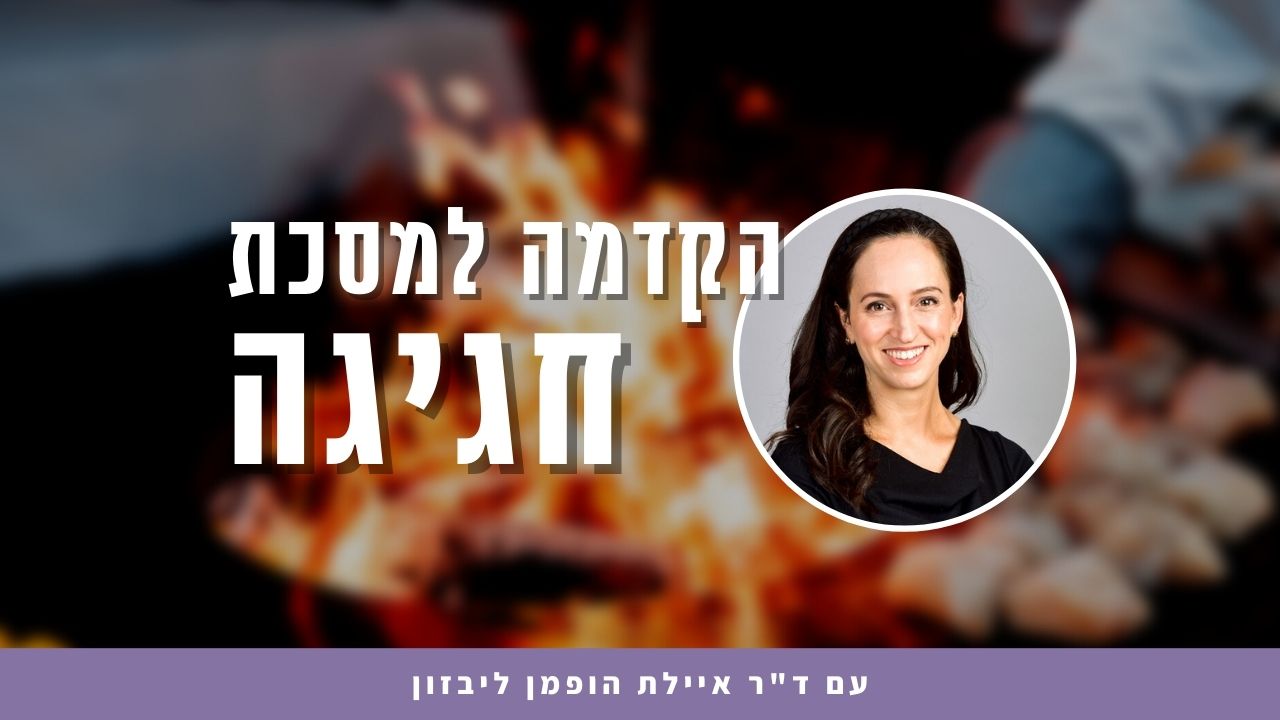חגיגה ה
וּמְחָרְיָא תַּנּוּרָא, שְׁקַלְתָּא וְאַנַּחְתָּא אַגַּבֵּהּ דְּכַרְעַהּ, קְדַחָא וְאִיתְּרַע מַזָּלַהּ, וְאַיְיתִיתַהּ.
and sweeping the oven. She took the fire and set it on her foot; she was scalded and her luck suffered, which gave me the opportunity, and I brought her.
אֲמַר לֵיהּ רַב בִּיבִי בַּר אַבָּיֵי: אִית לְכוּ רְשׁוּתָא לְמִיעְבַּד הָכִי? אֲמַר לֵיהּ, וְלָא כְּתִיב: ״וְיֵשׁ נִסְפֶּה בְּלֹא מִשְׁפָּט״? אֲמַר לֵיהּ, וְהָכְתִיב: ״דּוֹר הוֹלֵךְ וְדוֹר בָּא״!
Rav Beivai bar Abaye said to the Angel of Death: Do you have the right to act in this manner, to take someone before his time? The Angel of Death said to him: And is it not written: “But there are those swept away without justice” (Proverbs 13:23)? Rav Beivai said to him: And isn’t it written: “One generation passes away, and another generation comes” (Ecclesiastes 1:4), which indicates that there is a predetermined amount of time for the life of every generation.
אֲמַר: דְּרָעֵינָא לְהוּ אֲנָא עַד דְּמָלוּ לְהוּ לְדָרָא, וַהֲדַר מַשְׁלֵימְנָא לֵיהּ לְדוּמָה. אֲמַר לֵיהּ: סוֹף סוֹף, שְׁנֵיהּ מַאי עָבְדַתְּ? אֲמַר: אִי אִיכָּא צוּרְבָּא מֵרַבָּנַן דְּמַעְבֵּיר בְּמִילֵּיהּ — מוֹסֵיפְנָא לְהוּ לֵיהּ, וְהָוְיָא חִלּוּפֵיהּ.
He said to him: I shepherd them, not releasing them until the years of the generation are completed, and then I pass them on to the angel Duma who oversees the souls of the dead. Rav Beivai said to him: Ultimately, what do you do with his extra years, those taken away from this individual? The Angel of Death said to him: If there is a Torah scholar who disregards his personal matters, i.e., who overlooks the insults of those who wrong him, I add those years to him and he becomes the deceased’s replacement for that time.
רַבִּי יוֹחָנָן כִּי מָטֵי לְהַאי קְרָא, בָּכֵי: ״וַתְּסִיתֵנִי בוֹ לְבַלְּעוֹ חִנָּם״. עֶבֶד שֶׁרַבּוֹ מְסִיתִין לוֹ וְנִיסָת, תַּקָּנָה יֵשׁ לוֹ?! רַבִּי יוֹחָנָן כִּי מָטֵי לְהַאי קְרָא, בָּכֵי: ״הֵן בִּקְדֹשָׁיו לֹא יַאֲמִין״, אִי בִּקְדוֹשָׁיו לֹא יַאֲמִין — בְּמַאן יַאֲמִין?
§ The Gemara returns to the previous topic. When Rabbi Yoḥanan reached this verse, he cried, as God said to the Satan about Job: “Although you did incite Me against him, to destroy him without cause” (Job 2:3). Rabbi Yoḥanan said: With regard to a slave whose master is one whom others incite to act harshly against the slave and the master is incited to do so, is there a remedy for the slave? Additionally, when Rabbi Yoḥanan reached this verse, he cried: “Behold He puts no trust in His sacred ones” (Job 15:15), saying: If He does not place trust in His sacred ones, in whom does He place trust?
יוֹמָא חַד הֲוָה קָא אָזֵיל בְּאוֹרְחָא, חַזְיֵיהּ לְהָהוּא גַּבְרָא דַּהֲוָה מְנַקֵּיט תֵּאנֵי, שָׁבֵיק הָנָךְ דִּמְטוֹ וְשָׁקֵיל הָנָךְ דְּלָא מְטוֹ. אֲמַר לֵיהּ: לָאו הָנֵי מְעַלָּן טְפֵי? אֲמַר לֵיהּ: הָנֵי לְאוֹרְחָא בָּעֵינַן לְהוּ, הָנֵי נָטְרָן וְהָנֵי לָא נָטְרָן. אֲמַר, הַיְינוּ דִּכְתִיב: ״הֵן בִּקְדוֹשָׁיו לֹא יַאֲמִין״.
The Gemara relates: One day Rabbi Yoḥanan was walking along the road, and he saw a certain man who was picking figs in an unusual manner: He left the ones that had reached the stage of ripeness and took those that had not yet reached that state. Rabbi Yoḥanan said to him: Aren’t these ripe ones much better? He said to him: I need these figs for the road; these that are not yet ripe will be preserved, and these that are already ripe will not be preserved. Rabbi Yoḥanan said: This is the same as is written: “Behold He puts no trust in His sacred ones”; there are righteous people whom God takes from this world before their time, as He knows that in the future they will stumble.
אִינִי? וְהָא הָהוּא תַּלְמִידָא דַּהֲוָה בְּשִׁיבָבוּתֵיהּ דְּרַבִּי אֲלֶכְּסַנְדְּרִי וּשְׁכֵיב אַדְּזוּטַר, וַאֲמַר: אִי בָּעֵי הַאי מֵרַבָּנַן, הֲוָה חָיֵי. וְאִם אִיתָא, דִּלְמָא מֵ״הֵן בִּקְדוֹשָׁיו לֹא יַאֲמִין״ הֲוָה? הָהוּא מְבַעֵט בְּרַבּוֹתָיו הֲוָה.
The Gemara asks: Is that so? But there was a certain student in the neighborhood of Rabbi Alexandri, and he died while he was still young. And Rabbi Alexandri said: If this young Sage had wanted, he would have lived, i.e., his actions caused him to die young. And if it is so, as Rabbi Yoḥanan suggested, perhaps this student was from those concerning whom it is written: “Behold he puts no trust in his sacred ones,” and it was not his sins that caused his death. The Gemara answers: That student was one who acted irreverently toward his teachers, and Rabbi Alexandri knew of his improper behavior.
רַבִּי יוֹחָנָן כִּי מָטֵי לְהַאי קְרָא, בָּכֵי: ״וְקָרַבְתִּי אֲלֵיכֶם לַמִּשְׁפָּט וְהָיִיתִי עֵד מְמַהֵר בַּמְכַשְּׁפִים וּבַמְנָאֲפִים וּבַנִּשְׁבָּעִים לַשָּׁקֶר וּבְעוֹשְׁקֵי שְׂכַר שָׂכִיר״. עֶבֶד שֶׁרַבּוֹ מְקָרְבוֹ לְדוּנוֹ, וּמְמַהֵר לַהֲעִידוֹ — תַּקָּנָה יֵשׁ לוֹ?!
When Rabbi Yoḥanan reached this verse, he cried: “And I will come near to you to judgment; and I will be a swift witness against the sorcerers, and against the adulterers, and against false witnesses, and against those who oppress the hireling in his wages, the widow, and the fatherless, and who turn aside the convert from his right, and do not fear Me, says the Lord” (Malachi 3:5). He said: With regard to a slave whose master comes near to him to judge him and is swift to testify against him, is there a remedy for him?
אָמַר רַבִּי יוֹחָנָן בֶּן זַכַּאי: אוֹי לָנוּ שֶׁשָּׁקַל עָלֵינוּ הַכָּתוּב קַלּוֹת כַּחֲמוּרוֹת.
With regard to that same verse, Rabbi Yoḥanan ben Zakkai said: Woe to us, as the verse weighs lenient mitzvot for us like more stringent mitzvot, as it lists both those who violate sins punishable by death, e.g., sorcerers and adulterers, with those who violate apparently less severe sins, e.g., those who withhold payment from a hired worker.
אָמַר רֵישׁ לָקִישׁ: כׇּל הַמַּטֶּה דִּינוֹ שֶׁל גֵּר — כְּאִילּוּ מַטֶּה דִּינוֹ שֶׁל מַעְלָה, שֶׁנֶּאֱמַר: ״וּמַטֵּי גֵר״, ״וּמַטִּי״ כְּתִיב. אָמַר רַבִּי חֲנִינָא בַּר פָּפָּא: כׇּל הָעוֹשֶׂה דָּבָר וּמִתְחָרֵט בּוֹ — מוֹחֲלִין לוֹ מִיָּד, שֶׁנֶּאֱמַר: ״וְלֹא יְרֵאוּנִי״. הָא ״יְרֵאוּנִי״ — מוֹחֲלִין לָהֶם מִיָּד.
Reish Lakish said: Anyone who distorts the judgment of a convert, it is considered as if he distorted the judgment of the One above, as it is stated: “And who turn aside [umattei] the convert” (Malachi 3:5). This term is written as: Umatti, turn Me aside, i.e., one who distorts the judgment of a convert is considered as though he distorts the judgment of God, as it were. Rabbi Ḥanina bar Pappa said: Anyone who does something sinful and regrets it, he is forgiven immediately, as it is stated: “And do not fear Me” (Malachi 3:5), which indicates that if they do fear Me and are embarrassed to sin before God, they are forgiven immediately.
רַבִּי יוֹחָנָן כִּי מָטֵי לְהַאי קְרָא, בָּכֵי: ״כִּי אֶת כׇּל מַעֲשֶׂה הָאֱלֹהִים יָבִיא בְמִשְׁפָּט עַל כׇּל נֶעְלָם״. עֶבֶד שֶׁרַבּוֹ שׁוֹקֵל לוֹ שְׁגָגוֹת כִּזְדוֹנוֹת, תַּקָּנָה יֵשׁ לוֹ?!
Additionally, when Rabbi Yoḥanan reached this verse, he cried: “For God shall bring every work into the judgment concerning every hidden thing” (Ecclesiastes 12:14). He said: With regard to a slave whose master weighs his unwitting sins like intentional ones, i.e., God punishes him even for an action that was hidden from him, is there a remedy for him?
מַאי ״עַל כׇּל נֶעְלָם״? אָמַר רַב: זֶה הַהוֹרֵג כִּינָּה בִּפְנֵי חֲבֵרוֹ וְנִמְאָס בָּהּ. וּשְׁמוּאֵל אָמַר: זֶה הָרָק בִּפְנֵי חֲבֵירוֹ וְנִמְאָס.
The Gemara asks: What sin is the verse referring to when it states: “Concerning every hidden thing”? Rav said: This is referring to one who kills a louse in the presence of another and his friend is disgusted by it. God judges him for the unintentional discomfort he caused. And similarly, Shmuel said: This is referring to one who spits in the presence of another and his friend is disgusted by his action.
מַאי ״אִם טוֹב וְאִם רָע״? אָמְרִי דְּבֵי רַבִּי יַנַּאי: זֶה הַנּוֹתֵן צְדָקָה לְעָנִי בְּפַרְהֶסְיָא. כִּי הָא דְּרַבִּי יַנַּאי חַזְיֵיהּ לְהָהוּא גַּבְרָא דְּקָא יָהֵיב זוּזָא לְעָנִי בְּפַרְהֶסְיָא, אֲמַר לֵיהּ: מוּטָב דְּלָא יְהַבְתְּ לֵיהּ, מֵהַשְׁתָּא דִּיהַבְתְּ לֵיהּ וְכַסֵּפְתֵּיהּ.
The Gemara asks: What is the meaning of the end of that verse: “Whether it be good, or whether it be evil” (Ecclesiastes 12:14)? This verse indicates that God judges man harshly even for the good deeds he performs. The Sages from the school of Rabbi Yannai say: This verse is referring to one who gives charity to a poor person in public. Although he performed a good deed, he embarrassed the pauper, as in this case of Rabbi Yannai, who saw a certain man who was giving a dinar to a poor person in public. He said to him: It would have been better had you not given it to him than what you did, as now you gave it to him and embarrassed him.
דְּבֵי רַבִּי שֵׁילָא אָמְרִי, זֶה הַנּוֹתֵן צְדָקָה לְאִשָּׁה בַּסֵּתֶר, דְּקָא מַיְיתֵי לַהּ לִידֵי חֲשָׁדָא. רָבָא אָמַר: זֶה הַמְשַׁגֵּר לְאִשְׁתּוֹ בָּשָׂר שֶׁאֵינוֹ מְחוּתָּךְ בְּעַרְבֵי שַׁבָּתוֹת.
The Sages from the school of Rabbi Sheila say: This verse is referring to one who gives charity to a woman in private, as he subjects her to suspicion, for people might think that he is engaging her services as a prostitute. Rava said: This is referring to one who sends his wife meat that is not sliced, i.e., that has not yet had the prohibited sciatic nerve removed, on Shabbat eve. Since she is in a hurry she might not notice and will perhaps cook the prohibited meat.
וְהָא רָבָא מְשַׁגַּר! שָׁאנֵי בַּת רַב חִסְדָּא, דְּקִים לֵיהּ בְּגַוַּוהּ דִּבְקִיאָה.
The Gemara asks: But yet Rava himself would send this type of meat to his wife on Shabbat eve. The Gemara answers: The daughter of Rav Ḥisda, Rava’s wife, is different, as he was certain about her that she was an expert in this matter. Rava trusted that his wife would realize the sciatic nerve had not been removed even when she was in a hurry on Shabbat eve.
רַבִּי יוֹחָנָן כִּי מָטֵי לְהַאי קְרָא, בָּכֵי: ״וְהָיָה כִּי תִמְצֶאןָ אוֹתוֹ רָעוֹת רַבּוֹת וְצָרוֹת״. עֶבֶד שֶׁרַבּוֹ מַמְצִיא לוֹ רָעוֹת וְצָרוֹת, תַּקָּנָה יֵשׁ לוֹ?!
Additionally, when Rabbi Yoḥanan reached this verse, he cried: “Then it shall come to pass, when many evils and troubles are come upon them” (Deuteronomy 31:21). He said: With regard to a slave whose master brings upon him evils and troubles, is there a remedy for him?
מַאי ״רָעוֹת וְצָרוֹת״? אָמַר רַב: רָעוֹת שֶׁנַּעֲשׂוֹת צָרוֹת זוֹ לָזוֹ — כְּגוֹן זִיבּוּרָא וְעַקְרַבָּא.
The Gemara asks: What is the verse referring to when it states: “Evils and troubles”? Rav said: Evils that become troubles for one another, i.e., the remedy for one problem has a deleterious effect on the other. For example, one who is stung by a hornet and a scorpion. The sting of a hornet must be treated only with a cold ointment, while that of a scorpion must be treated with a hot ointment. As these medicaments are mutually exclusive, one cannot treat both stings at the same time.
וּשְׁמוּאֵל אָמַר: זֶה הַמַּמְצִיא לוֹ מָעוֹת לֶעָנִי בִּשְׁעַת דּוֹחְקוֹ. אָמַר רָבָא, הַיְינוּ דְּאָמְרִי אִינָשֵׁי: זוּזָא לְעַלְלָא לָא שְׁכִיחָא, לִתְלִיתָא שְׁכִיחַ.
And Shmuel said: This verse is referring to one who provides money to a poor person as a loan during his exigent financial circumstances, but immediately after the borrower is released from the initial pressure by receiving the loan, the lender begins to demand repayment, subjecting the recipient to further pressure. Rava said that this explains the folk saying that people say: A dinar for produce is not found; for hanging it can be found. A poor person cannot find money to buy basic necessities; however, when the lenders hang on and pressure him he must come up with the money somehow.
״וְחָרָה אַפִּי בוֹ בַיּוֹם הַהוּא וַעֲזַבְתִּים וְהִסְתַּרְתִּי פָנַי מֵהֶם״, אָמַר רַב בַּרְדְּלָא בַּר טַבְיוֹמֵי אָמַר רַב: כׇּל שֶׁאֵינוֹ בְּהֶסְתֵּר פָּנִים — אֵינוֹ מֵהֶם, כׇּל שֶׁאֵינוֹ בִּ״וְהָיָה לֶאֱכוֹל״ —
On the same topic the Gemara states: “Then My anger shall be kindled against them in that day, and I will forsake them, and I will hide My face from them, and they shall be devoured” (Deuteronomy 31:17). Rav Bardela bar Tavyumei said that Rav said: Anyone who is not subject to His hiding of the face, i.e., whose prayers are invariably answered, is not from the Jewish people, as the verse states about the Jewish people that God will hide His face from them as a result of their sins. Similarly, anyone who is not subject to: “And they shall be devoured,” i.e., gentiles do not steal his money,
אֵינוֹ מֵהֶם. אֲמַרוּ לֵיהּ רַבָּנַן לְרָבָא: מָר לָא בְּהֶסְתֵּר פָּנִים אִיתֵיהּ, וְלָא בִּ״וְהָיָה לֶאֱכוֹל״ אִיתֵיהּ! אֲמַר לְהוּ: מִי יָדְעִיתוּ כַּמָּה מְשַׁדַּרְנָא בְּצִנְעָא בֵּי שַׁבּוּר מַלְכָּא? אֲפִילּוּ הָכִי, יְהַבוּ בֵּיהּ רַבָּנַן עֵינַיְיהוּ. אַדְּהָכִי שַׁדּוּר דְּבֵי שַׁבּוּר מַלְכָּא וְגַרְבוּהוּ. אֲמַר: הַיְינוּ דְּתַנְיָא, אָמַר רַבָּן שִׁמְעוֹן בֶּן גַּמְלִיאֵל: כׇּל מָקוֹם שֶׁ״נָּתְנוּ חֲכָמִים עֵינֵיהֶם״ — אוֹ מִיתָה אוֹ עוֹנִי.
is not from among them. The Sages said to Rava: Master, you are not subject to His hiding of the face, as your prayers are heard, and you are not subject to: “And they shall be devoured,” as the authorities take nothing from you. He said to them: Do you know how many gifts I send in private to the house of King Shapur? Although it might seem that the monarchy does not take anything from me, in actuality I am forced to give many bribes. Even so, the Sages looked upon Rava with suspicion. In the meantime, messengers from the house of King Shapur sent for him and imprisoned him to extort more money from him. Rava said: This is as it is taught in a baraita that Rabban Shimon ben Gamliel said: Wherever the Sages looked upon someone, it resulted in either death or poverty.
״וְאָנֹכִי הַסְתֵּר אַסְתִּיר פָּנַי בַּיּוֹם הַהוּא״, אָמַר רָבָא, אָמַר הַקָּדוֹשׁ בָּרוּךְ הוּא: אַף עַל פִּי שֶׁהִסְתַּרְתִּי פָּנַי מֵהֶם — ״בַּחֲלוֹם אֲדַבֶּר בּוֹ״. רַב יוֹסֵף אָמַר: יָדוֹ נְטוּיָה עָלֵינוּ, שֶׁנֶּאֱמַר: ״וּבְצֵל יָדִי כִּסִּיתִיךָ״.
With regard to the verse: “And I will hide my face in that day” (Deuteronomy 31:18), Rava said that the Holy One, Blessed be He, said: Even though I hid my face from them and My Divine Presence is not revealed, nevertheless: “I speak with him in a dream” (Numbers 12:6). Rav Yosef said: His hand is outstretched, guarding over us, as it is stated: “And I have covered you in the shadow of my hand” (Isaiah 51:16).
רַבִּי יְהוֹשֻׁעַ בֶּן חֲנַנְיָה הֲוָה קָאֵי בֵּי קֵיסָר, אַחְוִי לֵיהּ הָהוּא מִינָא: עַמָּא דְּאַהְדְּרִינְהוּ מָרֵיהּ לְאַפֵּיהּ מִינֵּיהּ. אַחְוִי לֵיהּ: יָדוֹ נְטוּיָה עָלֵינוּ. אֲמַר לֵיהּ קֵיסָר לְרַבִּי יְהוֹשֻׁעַ: מַאי אַחְוִי לָךְ? עַמָּא דְּאַהְדְּרִינְהוּ מָרֵיהּ לְאַפֵּיהּ מִינֵּיהּ, וַאֲנָא מַחְוֵינָא לֵיהּ יָדוֹ נְטוּיָה עָלֵינוּ.
The Gemara relates: Rabbi Yehoshua ben Ḥananya was standing in the house of the Caesar. A certain heretic, who was also present, gestured to him, indicating that his was the nation whose Master, God, turned His face away from it. Rabbi Yehoshua gestured to him that His hand is outstretched over us in protection. The Caesar said to Rabbi Yehoshua: What did he gesture to you, and how did you respond? He replied: He indicated that mine is the nation whose Master turned His face from it, and I gestured to him that His hand is outstretched over us.
אֲמַרוּ לֵיהּ לְהָהוּא מִינָא: מַאי אַחְוִיית לֵיהּ? עַמָּא דְּאַהְדְּרִינְהוּ מָרֵיהּ מִינֵּיהּ. וּמַאי אַחְוִי לָךְ? לָא יָדַעְנָא. אֲמַרוּ: גַּבְרָא דְּלָא יָדַע מַאי מַחְווּ לֵיהּ, בְּמָחוֹג יַחְוֵי קַמֵּי מַלְכָּא?! אַפְּקוּהוּ וְקַטְלוּהוּ.
The members of the Caesar’s household said to that heretic: What did you gesture to him? He said to them: I gestured that his is the nation whose Master has turned His face from it. They asked: And what did he gesture to you? He said to them: I don’t know; I did not understand. They said: How can a man who does not know what others gesture to him dare to gesture in the presence of the king? They took him out and killed him.
כִּי קָא נִיחָא נַפְשֵׁיהּ דְּרַבִּי יְהוֹשֻׁעַ בֶּן חֲנַנְיָה, אֲמַרוּ לֵיהּ רַבָּנַן: מַאי תֶּיהְוֵי עֲלַן מִמִּינָאֵי? אָמַר לָהֶם: ״אָבְדָה עֵצָה מִבָּנִים נִסְרְחָה חׇכְמָתָם״. כֵּיוָן שֶׁאָבְדָה עֵצָה מִבָּנִים — נִסְרְחָה חׇכְמָתָן שֶׁל אוּמּוֹת הָעוֹלָם.
The Gemara relates: When Rabbi Yehoshua ben Ḥananya was dying, the Sages said to him: What will become of us, from the threat of the heretics, when there is no scholar like you who can refute them? He said to them that the verse states: “Is wisdom no more in Teiman? Has counsel perished from the prudent? Has their wisdom vanished?” (Jeremiah 49:7). He explained: Since counsel has perished from the prudent, from the Jewish people, the wisdom of the nations of the world has vanished as well, and there will be no superior scholars among them.
וְאִי בָּעֵית אֵימָא מֵהָכָא: ״וַיֹּאמֶר נִסְעָה וְנֵלֵכָה וְאֵלְכָה לְנֶגְדֶּךָ״.
And if you wish, say instead that the same idea can be derived from here: “And he said: Let us take our journey, and let us go, and I will go corresponding to you” (Genesis 33:12). Just as the Jewish people rise and fall, so too, the nations of the world simultaneously rise and fall, and they will never have an advantage.
רַבִּי אִילָא הֲוָה סָלֵיק בְּדַרְגָּא דְּבֵי רַבָּה בַּר שֵׁילָא. שַׁמְעֵיהּ לְיָנוֹקָא דַּהֲוָה קָא קָרֵי: ״כִּי הִנֵּה יוֹצֵר הָרִים וּבוֹרֵא רוּחַ וּמַגִּיד לְאָדָם מַה שִּׂיחוֹ״. אָמַר: עֶבֶד שֶׁרַבּוֹ מַגִּיד לוֹ מַה שִּׂיחוֹ תַּקָּנָה יֵשׁ לוֹ?! מַאי ״מַה שִּׂיחוֹ״? אָמַר רַב: אֲפִילּוּ שִׂיחָה יְתֵירָה שֶׁבֵּין אִישׁ לְאִשְׁתּוֹ מַגִּידִים לוֹ לְאָדָם בִּשְׁעַת מִיתָה.
The Gemara relates that Rabbi Ila was ascending the stairs in the house of Rabba bar Sheila, a children’s teacher. He heard a child who was reading a verse out loud: “For, lo, He Who forms the mountains, and creates the wind, and declares to man what is his speech” (Amos 4:13). Rabbi Ila said: With regard to a servant whose master declares to him what is his proper speech, is there a remedy for him? The Gemara asks. What is the meaning of the phrase: “What is his speech”? Rav said: Even frivolous speech that is between a man and his wife before engaging in relations is declared to a person at the time of death, and he will have to account for it.
אִינִי? וְהָא רַב כָּהֲנָא הֲוָה גָּנֵי תּוּתֵי פּוּרְיֵיהּ דְּרַב, וְשַׁמְעֵיהּ דְּסָח וְצָחַק וְעָשָׂה צְרָכָיו. אֲמַר: דָּמֵי פּוּמֵּיהּ דְּרַב כְּמַאן דְּלָא טְעִים לֵיהּ תַּבְשִׁילָא. אֲמַר לֵיהּ: כָּהֲנָא, פּוֹק! לָאו אוֹרַח אַרְעָא!
The Gemara asks: Is that so? Is it prohibited for a man to speak in this manner with his wife? Wasn’t Rav Kahana lying beneath Rav’s bed, and he heard Rav chatting and laughing with his wife, and performing his needs, i.e., having relations with her. Rav Kahana said out loud: The mouth of Rav is like one who has never eaten a cooked dish, i.e., his behavior is lustful. Rav said to him: Kahana, leave, as this is not proper conduct. This shows that Rav himself engaged in frivolous talk before relations.
לָא קַשְׁיָא: כָּאן דִּצְרִיךְ לְרַצּוֹיַהּ, הָא דְּלָא צְרִיךְ לְרַצּוֹיַהּ.
The Gemara answers: This is not difficult. Here, where this type of speech is permitted, it is referring to a situation where he must appease his wife before relations, and therefore this speech is appropriate. However, this statement, that it is prohibited, is referring to a situation where he doesn’t need to appease her. In these circumstances, it is prohibited to engage in excessively lighthearted chatter with one’s wife.
״וְאִם לֹא תִשְׁמָעוּהָ בְּמִסְתָּרִים תִּבְכֶּה נַפְשִׁי מִפְּנֵי גֵוָה״, אָמַר רַב שְׁמוּאֵל בַּר אִינְיָא מִשְּׁמֵיהּ דְּרַב: מָקוֹם יֵשׁ לוֹ לְהַקָּדוֹשׁ בָּרוּךְ הוּא וּמִסְתָּרִים שְׁמוֹ. מַאי ״מִפְּנֵי גֵוָה״? אָמַר רַב שְׁמוּאֵל בַּר יִצְחָק: מִפְּנֵי גַּאֲווֹתָן שֶׁל יִשְׂרָאֵל שֶׁנִּיטְּלָה מֵהֶם וְנִתְּנָה לַגּוֹיִם. רַבִּי שְׁמוּאֵל בַּר נַחְמָנִי אָמַר: מִפְּנֵי גַּאֲווֹתָהּ שֶׁל מַלְכוּת שָׁמַיִם.
The verse states: “But if you will not hear it, my soul shall weep in secret [bemistarim] for your pride” (Jeremiah 13:17). Rav Shmuel bar Inya said in the name of Rav: The Holy One, Blessed be He, has a place where He cries, and its name is Mistarim. What is the meaning of “for your pride”? Rav Shmuel bar Yitzḥak said: God cries due to the pride of the Jewish people, which was taken from them and given to the gentile nations. Rav Shmuel bar Naḥmani said: He cries due to the pride of the kingdom of Heaven, which was removed from the world.
וּמִי אִיכָּא בְּכִיָּה קַמֵּיהּ הַקָּדוֹשׁ בָּרוּךְ הוּא? וְהָאָמַר רַב פָּפָּא: אֵין עֲצִיבוּת לִפְנֵי הַקָּדוֹשׁ בָּרוּךְ הוּא, שֶׁנֶּאֱמַר: ״הוֹד וְהָדָר לְפָנָיו עוֹז וְחֶדְוָה בִּמְקוֹמוֹ״! לָא קַשְׁיָא: הָא בְּבָתֵּי גַוָּאֵי, הָא בְּבָתֵּי בַרָאֵי.
The Gemara asks: But is there crying before the Holy One, Blessed be He? Didn’t Rav Pappa say: There is no sadness before the Holy One, Blessed be He, as it is stated: “Honor and majesty are before Him; strength and gladness are in His place” (I Chronicles 16:27)? The Gemara responds: This is not difficult. This statement, that God cries, is referring to the innermost chambers, where He can cry in secret, whereas this statement, that He does not cry, is referring to the outer chambers.
וּבְבָתֵּי בַרָאֵי לָא? וְהָא כְּתִיב: ״וַיִּקְרָא אֲדֹנָי ה׳ צְבָאוֹת בַּיּוֹם הַהוּא לִבְכִי וּלְמִסְפֵּד וּלְקׇרְחָה וְלַחֲגוֹר שָׂק״! שָׁאנֵי חֻרְבַּן בֵּית הַמִּקְדָּשׁ, דַּאֲפִילּוּ מַלְאֲכֵי שָׁלוֹם בְּכוֹ, שֶׁנֶּאֱמַר: ״הֵן אֶרְאֶלָּם צָעֲקוּ חוּצָה מַלְאֲכֵי שָׁלוֹם מַר יִבְכָּיוּן״.
The Gemara asks: And doesn’t God cry in the outer chambers? Isn’t it written: “And on that day the Lord, the God of hosts, called to weeping, and to mourning, and to baldness, and to girding with sackcloth” (Isaiah 22:12)? The Gemara responds: The destruction of the Temple is different, as even the angels of peace cried, as it is stated: “Behold, their valiant ones cry without; the angels of peace weep bitterly” (Isaiah 33:7).
״וְדָמֹעַ תִּדְמַע וְתֵרַד עֵינִי דִּמְעָה כִּי נִשְׁבָּה עֵדֶר ה׳״, אָמַר רַבִּי אֶלְעָזָר: שָׁלֹשׁ דְּמָעוֹת הַלָּלוּ לָמָּה? אַחַת עַל מִקְדָּשׁ רִאשׁוֹן, וְאַחַת עַל מִקְדָּשׁ שֵׁנִי, וְאַחַת עַל יִשְׂרָאֵל שֶׁגָּלוּ מִמְּקוֹמָן. וְאִיכָּא דְּאָמְרִי: אַחַת עַל בִּיטּוּל תּוֹרָה.
The verse continues: “And my eye shall weep sore, and run down with tears, because the Lord’s flock is carried away captive” (Jeremiah 13:17). Rabbi Elazar said: Why these three references to tears in the verse? One is for the First Temple; one is for the Second Temple; and one is for the Jewish people who were exiled from their place. And there are those who say: The last one is for the unavoidable dereliction of the study of Torah in the wake of the exile.
בִּשְׁלָמָא לְמַאן דְּאָמַר עַל יִשְׂרָאֵל שֶׁגָּלוּ, הַיְינוּ דִּכְתִיב: ״כִּי נִשְׁבָּה עֵדֶר ה׳״, אֶלָּא לְמַאן דְּאָמַר עַל בִּיטּוּל תּוֹרָה — מַאי ״כִּי נִשְׁבָּה עֵדֶר ה׳״? כֵּיוָן שֶׁגָּלוּ יִשְׂרָאֵל מִמְּקוֹמָן — אֵין לְךָ בִּיטּוּל תּוֹרָה גָּדוֹל מִזֶּה.
The Gemara asks: Granted, according to the one who said that the last tear is for the Jewish people who were exiled, this is as it is written: “Because the Lord’s flock is carried away captive.” However, according to the one who said that this tear is for the dereliction of the study of Torah, what is the meaning of: “Because the Lord’s flock is carried away captive”? The Gemara answers: Since the Jewish people were exiled from their place, there is no greater involuntary dereliction of the study of Torah than that which was caused by this.
תָּנוּ רַבָּנַן, שְׁלֹשָׁה הַקָּדוֹשׁ בָּרוּךְ הוּא בּוֹכֶה עֲלֵיהֶן בְּכׇל יוֹם: עַל שֶׁאֶפְשָׁר לַעֲסוֹק בַּתּוֹרָה וְאֵינוֹ עוֹסֵק, וְעַל שֶׁאִי אֶפְשָׁר לַעֲסוֹק בְּתוֹרָה וְעוֹסֵק, וְעַל פַּרְנָס הַמִּתְגָּאֶה עַל הַצִּבּוּר.
The Sages taught that there are three types of people for whom the Holy One, Blessed be He, cries every day: For one who is able to engage in Torah study and does not engage in it; and for one who is unable to engage in Torah study and nevertheless he endeavors and engages in it; and for a leader who lords over the community.
רַבִּי הֲוָה נָקֵיט סֵפֶר קִינוֹת וְקָא קָרֵי בְּגַוֵּיהּ, כִּי מְטָא לְהַאי פְּסוּקָא ״הִשְׁלִיךְ מִשָּׁמַיִם אֶרֶץ״ — נְפַל מִן יְדֵיהּ, אֲמַר: מֵאִיגָּרָא רָם לְבֵירָא עַמִּיקְתָּא.
The Gemara relates: Rabbi Yehuda HaNasi was holding the book of Lamentations and was reading from it. When he reached the verse: “He has cast down from heaven to earth the beauty of Israel” (Lamentations 2:1), in his distress the book fell from his hand. He said: From a high roof to a deep pit, i.e., it is terrible to tumble from the sky to the ground.
רַבִּי וְרַבִּי חִיָּיא הֲווֹ שָׁקְלִי וְאָזְלִי בְּאוֹרְחָא, כִּי מְטוֹ לְהָהוּא מָתָא, אָמְרִי: אִיכָּא צוּרְבָּא מֵרַבָּנַן הָכָא? נֵזִיל וְנַיקְבֵּיל אַפֵּיהּ. אָמְרִי: אִיכָּא צוּרְבָּא מֵרַבָּנַן הָכָא, וּמְאוֹר עֵינַיִם הוּא. אֲמַר לֵיהּ רַבִּי חִיָּיא לְרַבִּי: תִּיב אַתְּ, לָא תְּזַלְזֵל בִּנְשִׂיאוּתָךְ. אֵיזִיל אֲנָא וְאַקְבֵּיל אַפֵּיהּ.
§ The Gemara relates: Rabbi Yehuda HaNasi and Rabbi Ḥiyya were walking along the road. When they arrived at a certain city, they said: Is there a Torah scholar here whom we can go and greet? The people of the city said: There is a Torah scholar here but he is blind. Rabbi Ḥiyya said to Rabbi Yehuda HaNasi: You sit here; do not demean your dignified status as Nasi to visit someone beneath your stature. I will go and greet him.
תַּקְפֵיהּ וַאֲזַל בַּהֲדֵיהּ. כִּי הֲווֹ מִיפַּטְרִי מִינֵּיהּ, אֲמַר לְהוּ: אַתֶּם הִקְבַּלְתֶּם פָּנִים הַנִּרְאִים וְאֵינָן רוֹאִין — תִּזְכּוּ לְהַקְבִּיל פָּנִים הָרוֹאִים וְאֵינָן נִרְאִין. אֲמַר לֵיהּ: אִיכוּ הַשְׁתָּא מְנַעְתַּן מֵהַאי בִּירְכְּתָא.
Rabbi Yehuda HaNasi grabbed him and went with him anyway, and together they greeted the blind scholar. When they were leaving him, he said to them: You greeted one who is seen and does not see; may you be worthy to greet the One Who sees and is not seen. Rabbi Yehuda HaNasi said to Rabbi Ḥiyya: Now, if I had listened to you and not gone to greet him, you would have prevented me from receiving this blessing.
אֲמַרוּ לֵיהּ: מִמַּאן שְׁמִיעָא לָךְ? מִפִּרְקֵיהּ דְּרַבִּי יַעֲקֹב שְׁמִיעַ לִי, דְּרַבִּי יַעֲקֹב אִישׁ כְּפַר חִיטַּיָּיא הֲוָה מְקַבֵּיל אַפֵּיהּ דְּרַבֵּיהּ כׇּל יוֹמָא. כִּי קַשׁ, אֲמַר לֵיהּ: לָא נִצְטַעַר מָר, דְּלָא יָכֵיל מָר.
They said to the blind scholar: From whom did you hear that we are worthy of this blessing? He said to them: I heard it from the instruction of Rabbi Ya’akov, as Rabbi Ya’akov of the village of Ḥitiyya would greet his teacher every day. When Rabbi Ya’akov grew elderly, his teacher said to him: Do not despair, my Master, that my Master is unable to make the effort to greet me. It is better that you should not visit me.
אֲמַר לֵיהּ, מִי זוּטַר מַאי דִּכְתִיב בְּהוּ בְּרַבָּנַן: ״וִיחִי עוֹד לָנֶצַח לֹא יִרְאֶה הַשָּׁחַת כִּי יִרְאֶה חֲכָמִים יָמוּתוּ״. וּמָה הָרוֹאֶה חֲכָמִים בְּמִיתָתָן יִחְיֶה — בְּחַיֵּיהֶן עַל אַחַת כַּמָּה וְכַמָּה.
Rabbi Ya’akov said to him: Is it a minor matter, that which is written about the Sages: “That he should still live always, that he should not see the pit. For he sees that wise men die” (Psalms 49:10–11)? In this regard an a fortiori inference applies: Just as one who sees Sages in their death will live, all the more so one who sees them in their lifetime. From here the blind scholar learned the importance of greeting Torah scholars, which is why he blessed the Sages who came to greet him.
רַב אִידִי אֲבוּהּ דְּרַבִּי יַעֲקֹב בַּר אִידִי הֲוָה רְגִיל דַּהֲוָה אָזֵיל תְּלָתָא יַרְחֵי בְּאוֹרְחָא וְחַד יוֹמָא בְּבֵי רַב, וַהֲווֹ קָרוּ לֵיהּ רַבָּנַן ״בַּר בֵּי רַב דְּחַד יוֹמָא״. חֲלַשׁ דַּעְתֵּיהּ, קָרֵי אַנַּפְשֵׁיהּ: ״שְׂחוֹק לְרֵעֵהוּ אֶהְיֶה וְגוֹ׳״. אֲמַר לֵיהּ רַבִּי יוֹחָנָן: בְּמָטוּתָא מִינָּךְ, לָא תַּעְנֵישׁ לְהוּ רַבָּנַן.
The Gemara relates: Rav Idi, father of Rabbi Ya’akov bar Idi, would regularly travel three months on the road to reach the study hall and as he would immediately travel back again to arrive home for the festival of Sukkot, he spent only one day in the school of Rav. And the Sages would disparagingly call him: A student of Torah for one day. He was offended and read the following verse about himself: “I am as one that is a laughingstock to his neighbor, a man who calls upon God, and He answers him” (Job 12:4). Rabbi Yoḥanan said to him: Please do not punish the Sages, i.e., do not take offense and be harsh with them, as this will cause them to be punished by God.
נְפַק רַבִּי יוֹחָנָן לְבֵי מִדְרְשָׁא וּדְרַשׁ: ״וְאוֹתִי יוֹם יוֹם יִדְרֹשׁוּן וְדַעַת דְּרָכַי יֶחְפָּצוּן״. וְכִי בַּיּוֹם דּוֹרְשִׁין אוֹתוֹ וּבַלַּיְלָה אֵין דּוֹרְשִׁין אוֹתוֹ?! אֶלָּא לוֹמַר לָךְ: כׇּל הָעוֹסֵק בַּתּוֹרָה אֲפִילּוּ יוֹם אֶחָד בַּשָּׁנָה — מַעֲלֶה עָלָיו הַכָּתוּב כְּאִילּוּ עָסַק כׇּל הַשָּׁנָה כּוּלָּהּ.
Rabbi Yoḥanan left Rav Idi and went to the study hall and taught: “Yet they seek Me daily, and delight to know My ways” (Isaiah 58:2). But is it possible that only during the day they seek Him and at night they do not seek Him? What is the meaning of daily? Rather, this verse comes to say to you that with regard to anyone who engages in Torah study even one day a year, the verse ascribes him credit as though he engaged in Torah study the entire year.
וְכֵן בְּמִדַּת פּוּרְעָנוּת, דִּכְתִיב: ״בְּמִסְפַּר הַיָּמִים אֲשֶׁר תַּרְתֶּם אֶת הָאָרֶץ״. וְכִי אַרְבָּעִים שָׁנָה חָטְאוּ? וַהֲלֹא אַרְבָּעִים יוֹם חָטְאוּ! אֶלָּא לוֹמַר לָךְ: כׇּל הָעוֹבֵר עֲבֵירָה אֲפִילּוּ יוֹם אֶחָד בַּשָּׁנָה — מַעֲלֶה עָלָיו הַכָּתוּב כְּאִילּוּ עָבַר כׇּל הַשָּׁנָה כּוּלָּהּ.
And the same applies to the attribute of punishment, as it is written: “After the number of the days in which you spied out the land, even forty days, for every day a year, shall you bear your iniquities” (Numbers 14:34). But did they sin for forty years? Didn’t they sin for only forty days? Rather, this comes to say to you that anyone who transgresses a sin even one day a year, the verse ascribes him liability as though he transgressed the entire year.
אֵי זֶהוּ קָטָן — כׇּל שֶׁאֵינוֹ יָכוֹל לִרְכּוֹב עַל כְּתֵפוֹ שֶׁל אָבִיו. מַתְקֵיף לַהּ רַבִּי זֵירָא:
§ The mishna taught: Who is a minor who is exempt from the mitzva of appearance in the Temple? Any child who is unable to ride on his father’s shoulders and ascend from Jerusalem to the Temple Mount. Rabbi Zeira strongly objects to this:

